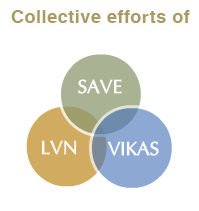In 2007, SABRAS (or “salt” in Hindi) was a social enterprise that was formed into a processing and marketing private limited company founded by Mr. Rajesh Shah. The uniqueness of the SABRAS’ salt product is that it is not only harnessed from the desert, but that it also shares a heart-felt story about marginalized workers that arduously provides us with salt, the most basic food ingredient throughout the world.
Note: In the blog, I’ll reference Mr. Rajesh Shah as “Rajeshbhai,” in which “bhai” is specific to Gujarat for “brother” in the Indian culture.
Rajeshbhai created SABRAS out his current techno-solutions company, Saline Area Vitalization Enterprise (SAVE).
SAVE works with two other organizations that were also created by Rajeshbhai. One of the two is Vikas (or “development” in Hindi), a NGO that was founded in 1978. The other of the two is LVN, which is a credit facility for the poor (currently in development). The three organizations were created to tackle marginalized workers throughout the state of Gujarat in India.
What typically should be a straightforward social enterprise model, Rajeshbhai has created a holistic solution by offering non-profit support, market-based services, and access to credit to address a systemic issue in his home state. With over 30 years of experience in social enterprises, trained as an architect, and influenced by Gandhi teachings, Rajeshbhai created SABRAS to initiate the “second salt march” in order to free agariyas (or salt workers) of unfair wages and working conditions in the Little Rann of Kutch in the Thar Desert located in western Gujarat.
[Insert location of the desert]
Agariyas have a significant socio-cultural influence in Gujarat and to India as a whole. During the 1940s, Gandhi and the agariyas led India’s revolution to Britian’s imposing imperialistic ways. It was only after the 21 mile freedom march, coined as the “first salt march,” did Britain finally agree to end their 100 year reign in India. The base of the independence movement was in [name] Ashram in Ahmedabad, Gujarat, in which Rajeshbhai has also set up his headquarters to alleviate the conditions of the current marginalized salt workers.
Gujarat produces 70% of the salt supply for the country, and India is third on the world’s production, or after U.S. and China. The agariyas in the Little Ran of Kutch produce up to 30% of the country’s supply, but earn less than $1 USD for their efforts. The packaging bag typically are worth more than worker’s wages. SABRAS has been created to provide supply chain expertise and marketing in order to pass fair wages and working conditions for the salt workers. Specifically, SABRAS has introduced a solar pump that reduced the diesel fuel cost for the workers to pump the salt water from 50 feet underground. With this solar pump, it offers a high-res solution that harness the power of the sun in the desert, and ultimately, helps the agariyas save up to Rp. 70,000 (or roughly USD $1,200). With that extra income, it raises the quality of life for the workers, such as providing education for the children as well as buying typical consumer good items like cell phones.
[insert pictures]
My work with SABRAS will be concentrated on both the processing and marketing functions of the organization. As my assignment unfolds, I look forward to sharing with you the details (or as much of it as I can in this blog!) Specifically from my time with SABRAS, I intend to gain supply chain experience in social enterprises as well as further my knowledge of cause-marketing.
Without a doubt, I am truly humbled and thankful for this opportunity be able to join Rajeshbhai and his staff in their efforts to alleviate the working conditions of marginalized workers in Gujarat, India.


